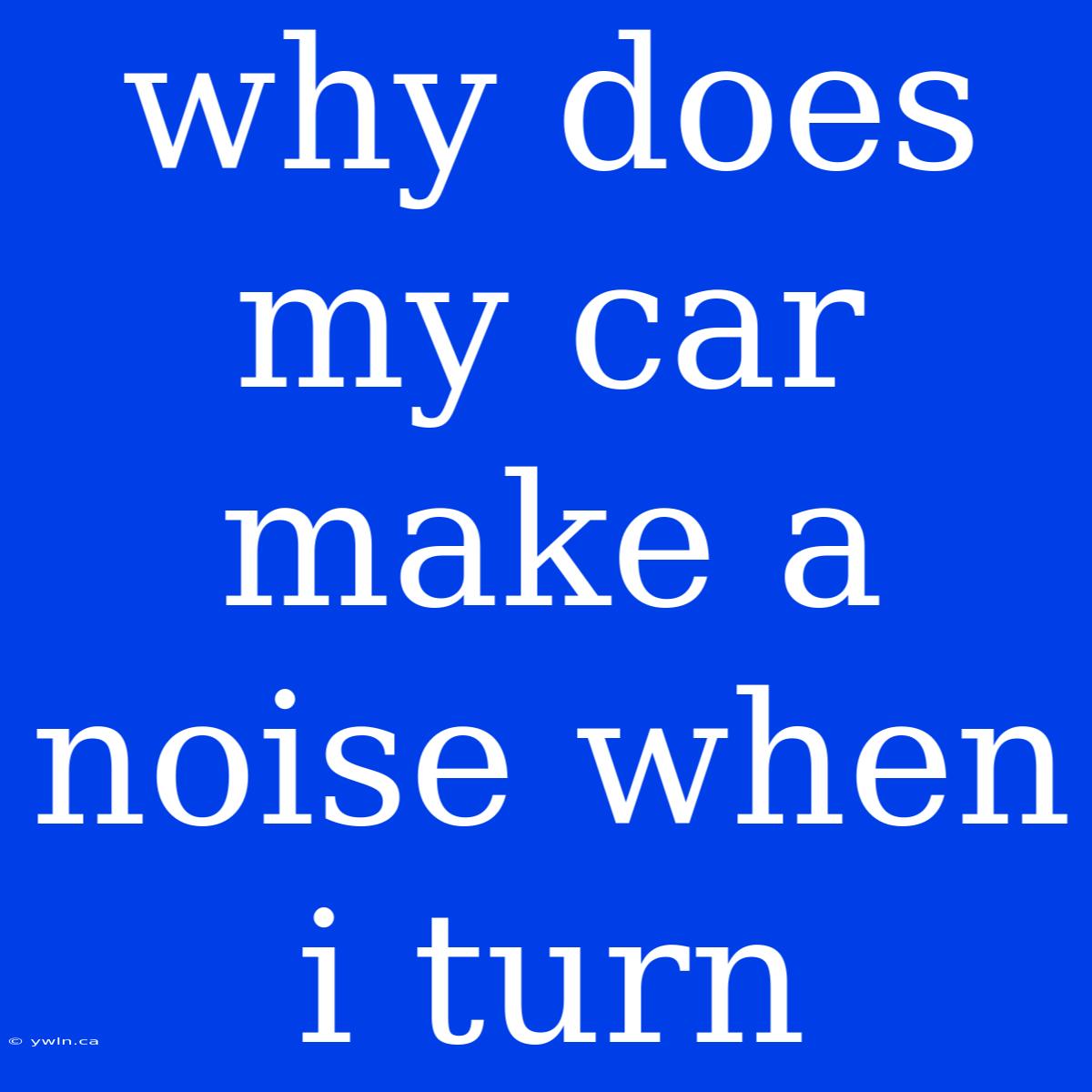Why Does My Car Make a Noise When I Turn? Unraveling the Mystery of Turning Sounds
Hook: Have you ever heard a strange noise emanating from your car when you turn the steering wheel? It could be a groan, a clunk, a grinding, or even a high-pitched whine. Understanding these sounds is crucial, as they could indicate a mechanical issue needing attention.
Editor Note: This guide delves into the common causes of noises when turning, providing insights for car owners to better understand their vehicle's health. Gaining knowledge about these sounds can save you potential headaches and expensive repairs down the line.
Analysis: We've combed through various resources and consulted with automotive experts to provide you with a comprehensive guide that dissects the possible reasons behind turning noises. This exploration will help you understand the source of the sound and take appropriate action, whether it's simply monitoring the situation or scheduling a mechanic visit.
Key Takeaways:
| Noise | Possible Causes | Severity |
|---|---|---|
| Grinding | Worn out wheel bearings, damaged CV joints | High |
| Clunking | Loose suspension components, worn out tie rod ends | Medium |
| Whining | Power steering pump issues, low fluid level | Medium |
| Groaning | Worn out suspension components, low power steering fluid | Low |
Turning Noises: A Deeper Look
Steering System
- Power Steering: This system aids in steering, making it easier to turn the wheel. A whining or groaning noise during turns could indicate low power steering fluid or a failing power steering pump.
- Steering Rack: This component links the steering wheel to the front wheels. A clunking sound could be a sign of wear and tear in the steering rack or its associated components.
- Tie Rod Ends: These connect the steering rack to the steering knuckles. A clicking or clunking sound might indicate worn out tie rod ends, which should be addressed promptly.
Suspension System
- Wheel Bearings: These components allow the wheels to rotate smoothly. A grinding noise, particularly when turning, is a strong indicator of worn out or damaged wheel bearings.
- CV Joints: These are crucial components in the drivetrain, transmitting power to the wheels. A clicking or clunking noise, especially when turning, could be a sign of a failing CV joint.
- Control Arms: These connect the wheels to the vehicle's frame. Worn out control arms can lead to a clunking or knocking sound, especially when turning sharply.
Understanding the Connection
The connection between these components and turning noises is straightforward. Steering, suspension, and drivetrain components work in tandem to ensure smooth vehicle operation. When any of these parts wear out or become damaged, the friction and movement during turns can create noticeable sounds.
Power Steering
- Introduction: The power steering system is vital for ease of steering, especially at low speeds.
- Facets:
- Role: Assists in steering by reducing the effort required to turn the wheels.
- Examples: Whining noise, groaning, fluid leaks.
- Risks & Mitigations: Failing pump, low fluid level. Regular fluid checks and timely replacement are crucial.
- Impacts & Implications: Steering difficulty, reduced vehicle control.
Summary: Power steering issues can manifest as various noises during turns. Maintaining appropriate fluid levels and promptly addressing any leaks or pump problems is essential for safe and comfortable driving.
Wheel Bearings
- Introduction: Wheel bearings are essential for smooth wheel rotation and vehicle stability.
- Facets:
- Role: Allow wheels to rotate freely while supporting the vehicle's weight.
- Examples: Grinding noise, whirring sound, uneven tire wear.
- Risks & Mitigations: Worn out bearings, damage due to impact. Regular inspections and prompt replacement are crucial.
- Impacts & Implications: Steering instability, uneven tire wear, reduced vehicle control.
Summary: Damaged wheel bearings can significantly impact your vehicle's performance and safety. Regular inspections and immediate replacement are vital to prevent further damage and ensure safe driving.
FAQ
- Q: How do I know if it's a serious issue?
- A: If the noise is accompanied by other symptoms like steering difficulty, vehicle instability, or a noticeable change in handling, it's crucial to address it promptly.
- Q: Can I drive with a noise when turning?
- A: It's not advisable to ignore the issue. Driving with a turning noise could lead to further damage and potentially unsafe driving conditions.
- Q: What should I do if I hear a noise?
- A: It's recommended to have a qualified mechanic inspect the vehicle and diagnose the cause of the noise.
Tips for Preventing Turning Noises
- Regular maintenance: Adhere to the manufacturer's recommended service schedule for oil changes, fluid checks, and inspections.
- Power steering fluid: Keep the power steering fluid topped off and inspect it for leaks or contamination.
- Suspension components: Inspect suspension components for wear and tear, including wheel bearings, tie rod ends, and control arms.
- Tire pressure: Maintain proper tire pressure to avoid uneven wear and strain on the suspension.
- Driving habits: Avoid aggressive driving maneuvers that could put unnecessary stress on suspension components.
Summary of Turning Noises
Understanding the potential causes of noises when turning is essential for any car owner. By recognizing the signs, identifying the possible issues, and taking proactive steps, you can ensure your vehicle's safety and performance.
Closing Message: Your car's noises are often whispers of its mechanical well-being. By paying attention to these sounds and seeking professional advice when needed, you can keep your vehicle running smoothly and safely for years to come.

